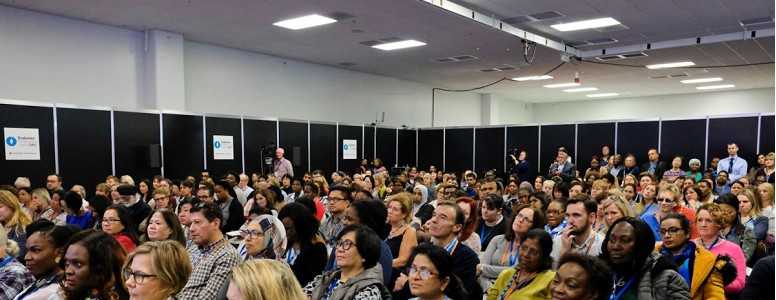The second day of a major diabetes conference for healthcare professionals was dominated by a “lively and engaging” debate about childhood obesity.
Thousands of delegates attended Diabetes Professional Care 2018 (DPC2018) in London’s Olympia, where a panel of leading clinicians and policymakers took part in the discussion.
Rt Hon. Keith Vaz MP, Chair of APPG Diabetes was joined by Dr Max Davie, Health Promotion Officer at the Royal College of Paediatrics and Child Health, Dr Fiona Campbell, Consultant Diabetes Paediatrician at Leeds Children’s Hospital and Dr Mayank Patel, Consultant Diabetologist at University Hospital Southampton.
All four presented their views on key issues associated with childhood obesity including advertising, food labelling, family environment, technology, digital health and social media.
The Diabetes Times Editor Oliver Jelley said: “Childhood obesity is dominating the headlines right now, so it was a highly relevant subject for this year’s Live Debate. The contributors all have vast experience within their field of work, so it was hugely interesting hearing their ideas about the subject. It certainly made for a lively and engaging discussion.”
According to the 2015/16 results of the National Child Measurement Programme (NCMP) in England, over a third of year 6 schoolchildren were measured as overweight or obese.
DPC founder Maggie Meer, who also has the condition, said: “We already know type 2 diabetes is associated with poor lifestyle and can be avoided through a combination of diet, exercise and education but, sadly, it seems the younger generation have missed out on being told these vital health tips.”
The schedule for the second day was once again busy and kicked off in the morning with Dr Paul Chrisp, NICE’s Director at the Centre for Guidelines who gave the keynote speech about how the organisation’s recommendations are developed, and how they help attendees commission and provide high quality, person-centred care.
Professor Alan Sinclair, Director of Diabetes Frail and the Foundation for Diabetes Research in Older People (FDROP), spoke about individualising diabetes care for older people with a focus on frailty, followed by a presentation delivered by Dr Kevin Fernando, a GP from Scotland, about biosimilar medicines.
The subject of safer acute care for people with diabetes was approached by Dr Mayank Patel, a Consultant in Diabetes and Senior Clinical Lecturer at University Hospital Southampton NHS Trust and University of Southampton.
The timetable for the rest of the day remained full and varied with many people queuing to attend each session. There were workshops on primary care training, how to empower patients to improve their diabetes and advice on injection techniques.
In the afternoon Dr Partha Kar joined Professor Gerry Rayma, Head of Service at the Diabetes and Endocrine Centre, and the Diabetes Research Unit at Ipswich Hospitals NHS for a talk about reducing variation of diabetes care across England.
In the evening the inaugural DPC Industry Awards, in partnership with The Diabetes Times, were held, celebrating success and innovation across pharmaceutical, medical device and life sciences companies working in diabetes care.
The winners were presented with a trophy by Mail Online’s Health Editor Stephen Matthews.
He said: “It was a huge honour to be asked to attend the very first DPC Industry Awards. The event was a great way to celebrate innovation among the companies and organisations working to improve the lives of people with diabetes.”
Founder Maggie Meer, who has type 2 diabetes and set up the conference in a bid to improve care, said: “We’re proud, once again, to welcome many of the foremost thought-leaders and practitioners in diabetes care to share their expertise at our conference and workshop sessions.
“As the number of people diagnosed with diabetes continues to grow, it is more important than ever that they have this unique forum in which to impart their knowledge and experience.”
Commenting on the rise of DPC, Oliver Jelley, Editor of The Diabetes Times, said: “DPC has quickly become a force for good in diabetes care in the UK, with the conference acting like a platform to share best practice and innovation across the NHS to improve care for people with diabetes.”
What's new on the forum? ⭐️
Get our free newsletters
Stay up to date with the latest news, research and breakthroughs.





